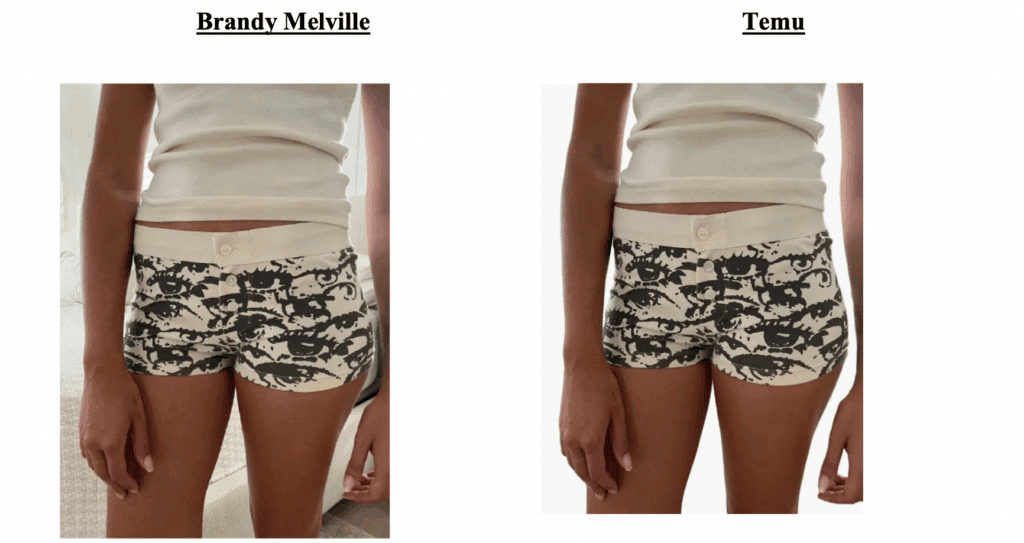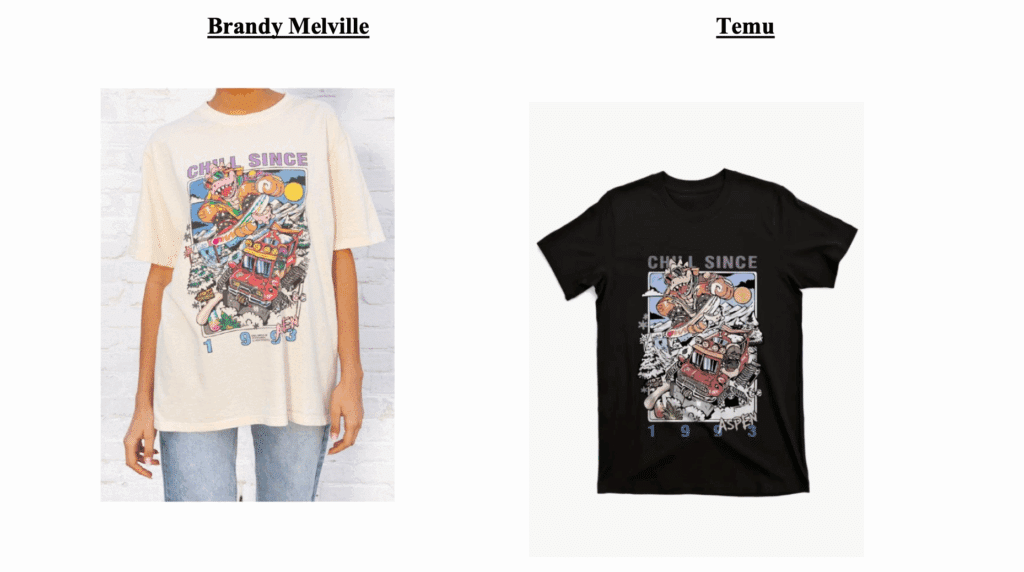On the heels of filing suit against Shein for allegedly offering up knockoff apparel, Brandy Melville is taking on Temu. The popular fashion label’s corporate entities, Bastiat USA, Inc. and Y.Y.G.M. SA (collectively, “Brandy Melville“), have filed a federal lawsuit accusing Temu of systematically trading on Brandy Melville’s name and designs. In a newly filed complaint, Brandy Melville alleges that Temu’s business model hinges on selling counterfeit versions of its apparel – often promoted using the brand’s own product images – while positioning itself as a neutral e-commerce “marketplace.”
According to the complaint, which was filed on July 21 in the U.S. District Court for the District of New Jersey, Temu is offering copycat wares that infringe both trademark and copyright-protected elements. For example, Brandy Melville contends that Temu has willfully infringed its rights in the “Brandy ♥ Melville,” “CHILL SINCE,” and “RADIO SILENCE” trademarks. At the same time, the teen-favored brand claims that Temu is offering apparel that replicates its copyright-protected Eye Fabric Design.


Searches on Temu for “Brandy Melville” or brand-specific phrases, such as “CHILL SINCE,” allegedly lead directly to unauthorized knockoffs, with some product listings featuring images identical to those on Brandy Melville’s official website. This, the brand argues, amounts to a “bait-and-switch” scheme that confuses consumers and dilutes its hard-earned reputation. In many cases, customers believe they are buying authentic Brandy Melville items, only to receive lower-quality imitations that bear little resemblance to the advertised product.
The “Marketplace” That Isn’t
More compelling than the infringement claims themselves are Brandy Melville’s arguments about Temu’s marketplace model. In its complaint, Brandy Melville asserts that Temu exercises “control over its so-called independent sellers as to almost every aspect of its marketplace.” This framing appears aimed at getting ahead of one of Temu’s likely defenses: that it is merely a neutral platform and therefore not liable for infringement. Like Amazon and other large e-commerce players, Temu frequently portrays itself as a digital “mall” that simply connects independent sellers with consumers. Such a distinction can significantly limit a platform’s liability for intellectual property violations, as courts have often been reluctant to hold marketplaces responsible for the actions of third-party merchants.
> The complaint references similar claims in Shein’s ongoing suit against Temu, which portrays Temu as a platform that encourages infringement while presenting itself as a passive intermediary. Specifically, Brandy Melville points to Shein’s allegations that Temu “masquerades as a legitimate e-commerce ‘marketplace’” while actually controlling its sellers’ activities – from dictating product listings and pricing to encouraging infringement and even preventing sellers from removing infringing products once flagged.
By alleging that Temu dictates what products can be sold, sets their prices, manages payment and logistics, and actively promotes these products through its app and social channels, the plaintiffs argue that Temu functions not as a passive platform but as a centralized retailer that should be held liable for the infringement that occurs on its site.
If the court accepts this characterization, Temu could be held directly liable for the counterfeit goods sold on its platform – not just indirectly or through contributory infringement claims. This would expose Temu to significantly higher damages, while also threatening to upend the “marketplace” narrative that has fueled its rapid rise in the U.S.
Brandy Melville is seeking preliminary and permanent injunctions to stop Temu from selling infringing products, along with the destruction of all counterfeit inventory and related marketing materials. It is also demanding an accounting of Temu’s profits derived from the alleged counterfeits.
THE BOTTOM LINE: The case may test whether Temu can continue to operate under the “marketplace” label while allegedly curating, pricing, and promoting goods that mimic one of fashion’s most recognizable names.
The case is Bastiat USA, Inc. and Y.Y.G.M. SA v. PDD Holdings Inc., et al., 2:25-cv-10657 (D.N.J.).














